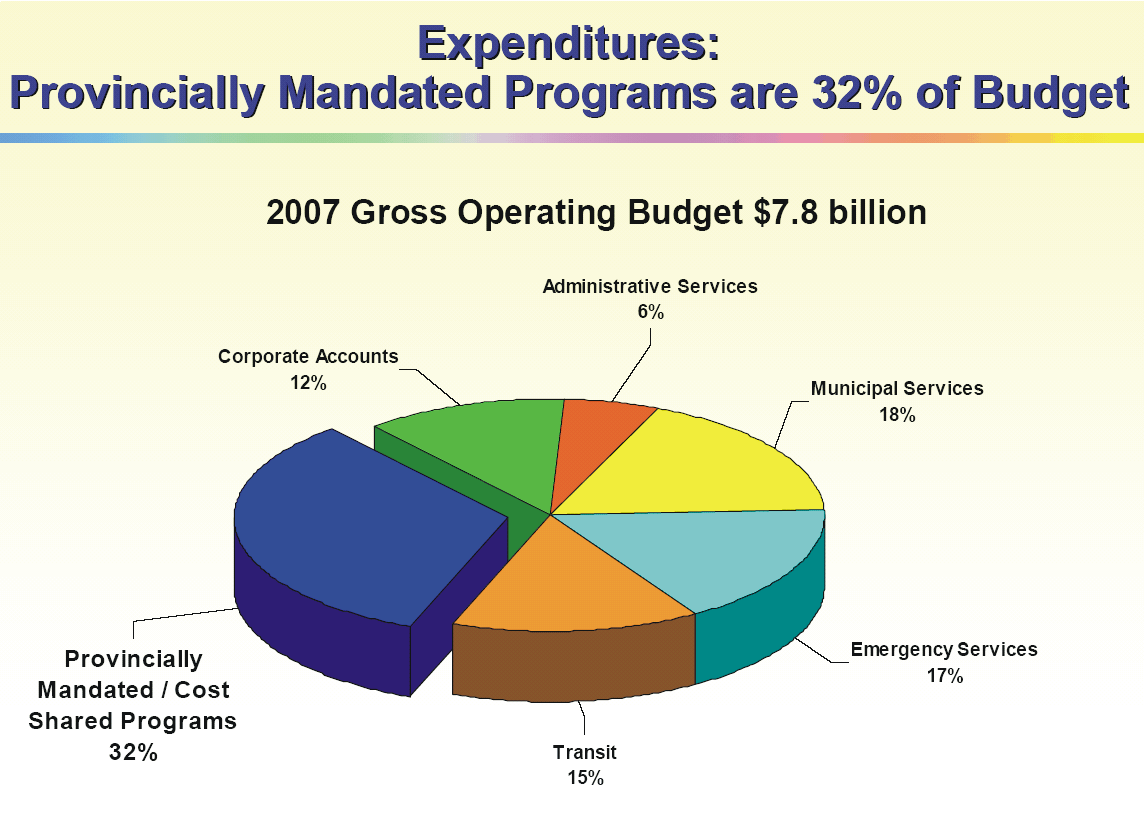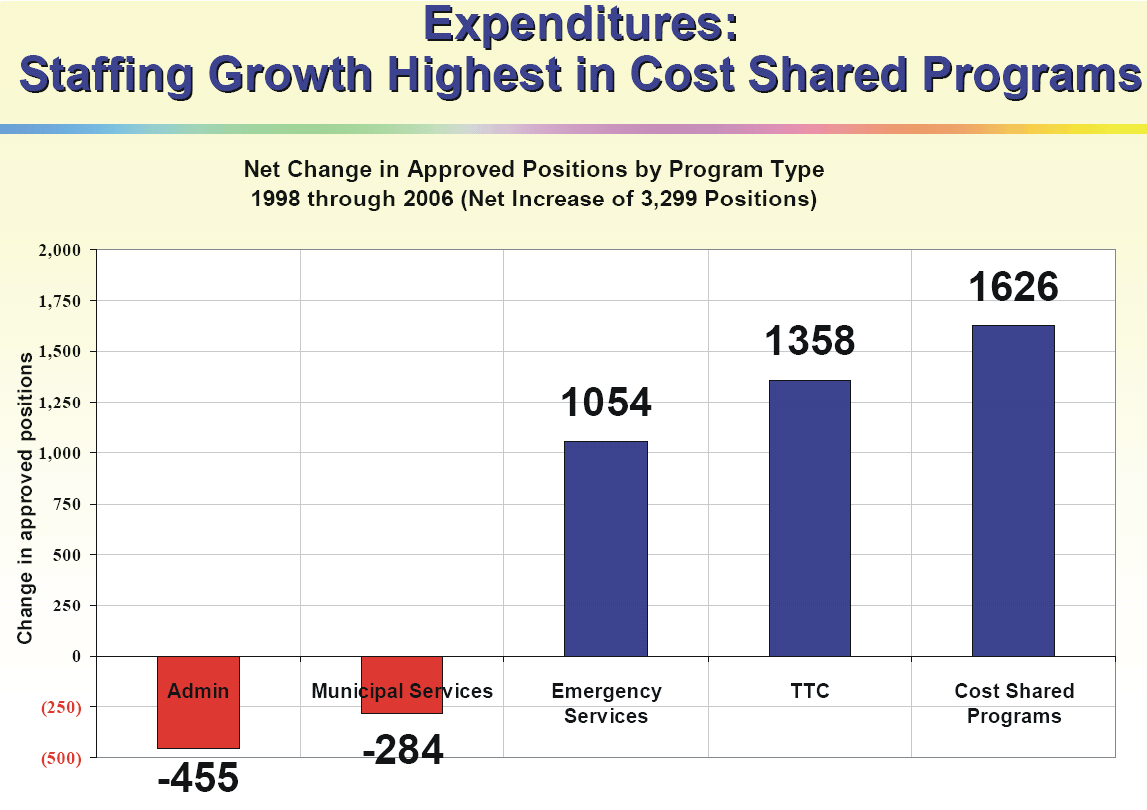The City's Deficit: Challenge and Response
The challenge facing the City is an immediate one: the City has a Revenue shortfall of nearly $600 million in the 2008 budget. (The Conference Board of Canada concluded that the City's "structural" deficit is closer to $1 billion a year.)
Question: Why has the tax issue suddenly surfaced? Did the City not see it coming?
Answer: I certainly did and that is why I began talking about tax reform a long time ago. But many Councillors preferred to "put it off" and, instead, recommend: selling city assets; accessing reserve bank funds; introducing user fees; modestly increasing property taxes (usually by 3%); and relying on the federal and provincial governments for bailouts.
In short, no one wanted to be the one "to bell the cat."
Today, we have few remaining assets, our reserve accounts have been drained, and the provincial and federal governments have told us to manage our own financial affairs.
Furthermore, city planners tell us that we have to start preparing to serve an extra million people over the next 25 years!
Clearly, the problem has grown over the years and City Councillors must now face it in a direct, financially responsible, manner.
 The SHORT Analysis The SHORT Analysis 
THERE ARE FOUR POTENTIAL OPTIONS WHICH CAN BE TAKEN TO RESPOND TO THIS CRISIS:
1. Eliminate Waste and Reduce Costs by Delivering Services in Co-operation with the Private Sector
This is the most frequently recommended option. And it's been the City's first option as well. In 2007, the City saved $70 million. Since amalgamation, it has saved over $500 million in total.
2. Reduce the Staff Hired Since Amalgamation
If you want to cut back on the areas that have grown significantly since amalgamation, you'd be primarily reducing the police and the TTC. (See the chart in the "LONG Analysis" segment)
3. Raise property taxes
This has been the traditional way of paying for most city services.
The size of the increase to cover the financial shortfall would need to be 20% or more over an indefinite period. Unfortunately, this will impact the quality of life and pose an immediate financial hardship for low-income families and seniors on fixed pensions.
4. Seek new revenue sources
Most of the big cities of the world have long abandoned property taxes as their primary source of income, and have moved into user fees and alternative tax revenues in an effort to distribute the tax load more fairly. The city of Chicago, for example, has an average property tax of $700 because it has access to income, sales and land transfer fees. This is the goal to which the city has and should be prepared to work towards.
- My Position:
- Continue #1. I recently pointed to the Mayor a possible $50,000,000.00 annual savings in the city's running of the 160,000 units run by the Toronto Community Housing Corporation (TCHC).
- Seek a bit of relief in the minor area in #2.
- Stay away from #3.
- Make #4 as fair as possible.
 The LONG Analysis The LONG Analysis 
THERE ARE FOUR POTENTIAL OPTIONS WHICH CAN BE TAKEN TO RESPOND TO THIS CRISIS:
1. Eliminate Waste and Reduce Costs by Delivering Services in Co-operation with the Private Sector
This is the most frequently recommended option. And it's been the City's first option as well. The city reviews its spending annually. In 2007, we saved $70 million. Since amalgamation, we have saved over $500 million in total.
But here are its major limitations:
A large part of the budget is mandated by the provincial government (see the chart).

The contracting out of services like garbage, for example (and others), have been recommended. But the reality is that in this upcoming budget year- assuming the changes went unopposed - the savings that Council would recommend will barely reach $100 million. That leaves a $500 million shortfall.
Question: But what about the stories in the media about mismanagement at City Hall?
Answer: The media love conflict. We all know that; and I know, from personal experience, that there is waste and inefficiency but not on a scale that would - if addressed - solve our financial problem.
You may not know but the Province appointed an independent auditor to look at the city's books and he concluded that Toronto was the best or close to the best for the best performance among Ontario cities in 47/50 categories.
Further, the Province appointed an independent auditor to look at the City's books and he concluded that Toronto was one of the best financially managed City's in Ontario.
2. Reduce the Staff Hired Since Amalgamation
Please look at the following chart. It shows where the city has cut costs and where costs have risen. Notice the essential services that would have to be cut in order to balance the budget.

I'm constantly hearing that we need better TTC service in Scarborough (subway or rapid transit line); more policing; more fire and ambulance; more community centres, and more recreational programs.
These are all necessary programs but we need the revenue to fund them.
3. Raise property taxes
This has been the traditional way of paying for most city services.
Unfortunately it's a flat tax that's blind to the property owners' economic situation and is particularly hard on seniors.
And the size of the hit that would be needed to cover a ½ a billion dollars would be 20% or more! And that increase would stay with the property forever.
4. Seek new revenue sources
Most of the big cities of the world have long abandoned property taxes as their major source of income - for the reasons I've just outlined above - and have moved into user fees and alternate tax revenues - in an effort to bring relief to property owners by distributing the tax load more fairly.
For example: A senior phoned me, beside herself with the worry at the charges being proposed.
I asked her if there were people owning and driving cars in Toronto that didn't pay property taxes? When she replied, "of course," I asked her if her tax load would be heavier or lighter with a city vehicle tax. She replied, "lighter" because people renting rooms or living in basements would now have to pay for city services they hadn't paid for in the past.
And since she had no plans to move, she'd continue to receive city services without paying for them with increased property taxes.
Question: Some people are talking about moving to the 905 to escape these new taxes. Would that help them?
Answer: I'm puzzled that people would talk about moving to an area where property taxes are 25-50% higher than Toronto's.
Look at this chart. Enter your present tax in the left hand column. Then multiply it to determine your tax if you lived in the 905.
| Region
|
Current Property Tax
|
Multiply by
|
New Property Tax
|
| York |
$ |
1.19653 |
$ |
| Peel |
$ |
1.175504 |
$ |
| Durham/Mississauga |
$ |
2.00416 |
$ |
And, imagine, you'd be paying those extra taxes for as long as you live there!
Question: Are the new revenue streams the complete, final answer to the City's financial problems?
Answer: I see these sources as an interim response - a bridge to a more permanent, fairer system of taxation involving user fees, income tax, sales tax, and GST. With these in place, I believe that property taxes could be significantly lower as 905ers, tourists, and non-property owners begin to pay their fair share based on ability to pay and the use of services which run Canada's biggest, most complex city.
So there you have it.
I hope that I have clarified my support for New Revenue Streams.
I urge you to look at this issue from a citywide perspective. Toronto is one of the world's leading cities. The competition to remain at this level is fierce and if we cannot find the revenue resources to invest into our city then, lifestyles for our residents will begin to constrict. What a legacy to leave future generations.
If you have any questions, comments or solutions that I've not considered, please give me a call.

About Norm Kelly | Community Based Services | Norm in the Community | Latest News | Community Calendar
Riding Profile | Important Phone Numbers | Contact Information
Feedback | | Link to the City of Toronto | Home
|














